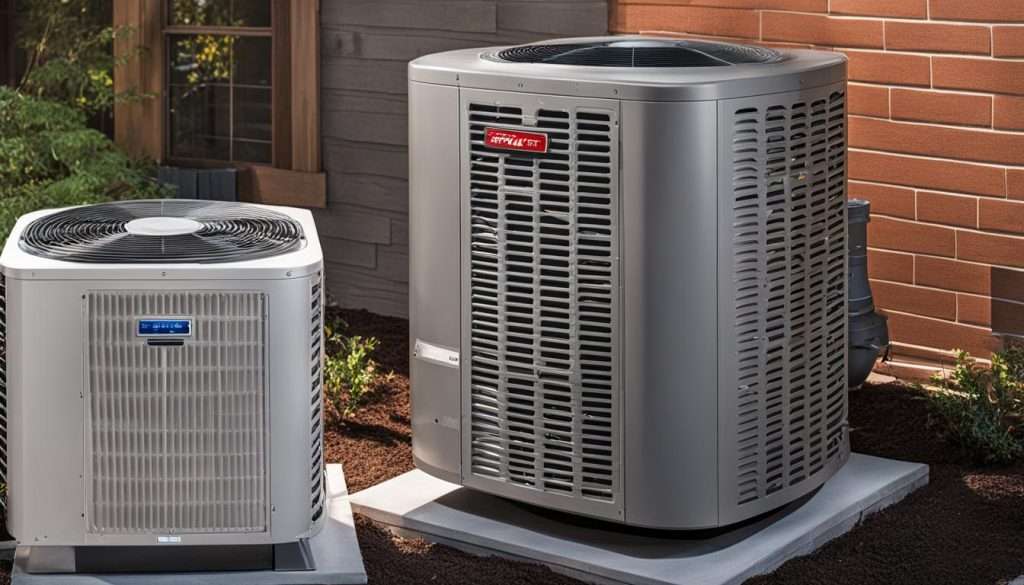Did you know that heating and cooling use about 54% of a typical household’s energy in the U.S.? The efficiency of your HVAC system affects your energy costs and comfort. There are two main types of heating systems: furnaces and heat pumps. Each has its own benefits and works best in different climates and energy sources.
Furnaces can run on natural gas, oil, propane, or electricity. They are a good choice for many places. Heat pumps, being more energy-efficient, mainly use electricity and work well in milder climates. But, in very cold areas, they don’t perform as well. Hybrid systems, which mix a furnace and a heat pump, offer a better heating solution in some cases.
With new technology, ductless heating and geothermal heat pumps are becoming more popular. They save energy and can adapt to different needs.
Key Takeaways
- Heating and cooling account for 54% of a household’s energy usage in the U.S.
- Furnaces can use natural gas, oil, propane, or electricity as fuel.
- Heat pumps are more energy-efficient in mild climates but less effective in extreme colds.
- Hybrid systems combine furnace and heat pump advantages for customized heating.
- Ductless heating systems and geothermal heat pumps are emerging as energy-saving options.
Introduction to HVAC Heating Systems
Choosing an HVAC system is a big decision. It affects how much energy you use, how comfortable your home is, and how long it lasts. Getting it installed right makes sure it works well. This means it uses less energy and keeps the air clean inside.
In the U.S., many homes have furnaces and air conditioners. They move air with the right temperature through ducts. This setup is reliable for keeping the temperature steady. But, it can make the air quality bad if not kept clean.
New technology has brought new HVAC options. Heat pumps are one example. They are great at both heating and cooling. They help control the temperature well and use less energy.
Ductless mini-split systems are also getting popular. They let you control the temperature in different parts of your home without ducts. This makes the air cleaner. As people look for ways to save energy and get better HVAC systems, these new options are becoming more popular.
Forced-Air Systems: Furnaces and Air Conditioners
Forced-air systems are a top choice for many homeowners in the U.S. They are known for their flexibility and efficiency. These systems use furnaces that run on natural gas or electricity. They work with electric air conditioners to keep homes comfortable all year.
The main reason people like forced-air heating is its cost-effectiveness and easy setup. It’s a great option for those wanting to improve their home’s HVAC.
Efficiency of furnaces is also key. Today’s furnaces have high-efficiency ratings, which means they use energy better and save money over time. Brands like Carrier, Trane, and Lennox offer many efficient HVAC models for different needs and budgets.
However, there are some downsides to consider. Gas furnaces can be risky if not kept up, like causing carbon monoxide poisoning. Regular checks and upkeep can help avoid these issues, keeping the system safe and efficient.
To sum up, forced-air heating and cooling systems offer great value. They are affordable, easy to install, and efficient. With many top HVAC brands available, homeowners can easily find the right system for their needs. This ensures a cozy home environment.
Understanding Heat Pumps
Heat pumps are now a key part of modern HVAC systems. They are known for their energy-saving features. These devices, especially air-source heat pumps, can heat and cool your home with one system. They work by moving heat instead of making it, which saves a lot of energy.
In places with mild weather, air-source heat pumps work best. They help lower your energy bills and are better for the planet. But in very cold areas, they might not be enough to keep you warm, so you might need extra heaters.
If you only have electricity for heating, air-source heat pumps are a great choice. They use the heat that’s already around, not making new heat. This makes them a smart pick for keeping your home comfy and saving energy.
Also, air-source heat pumps work well with solar energy systems. Using solar panels with these pumps makes them even more cost-effective and eco-friendly. This setup is good for the environment and can save you money, fitting well with the move towards renewable energy.
What are the two types of heat HVAC?
Heating, Ventilation, and Air Conditioning (HVAC) systems use two main ways to warm spaces. They either make heat by burning fuel or move heat from one place to another. These methods differ in how they use energy and adapt to the climate.
- Fuel Combustion Systems: This type includes furnaces that burn natural gas, oil, or propane to create heat. They work well in cold areas by providing steady warmth. Yet, they need to be made more energy-efficient to use less fuel and reduce emissions.
- Heat Pumps: These systems move heat from outside to inside using electricity. They work great in mild climates and save energy. But, they might not work well in very cold weather, so they need special adjustments.
A dual-fuel heating system or hybrid system uses both methods. It runs on a heat pump for mild weather to save energy. Then, it switches to a gas-fired furnace in the cold to keep costs down. This mix of systems is popular in places with changing weather.
Comparing Furnaces and Heat Pumps
When looking at HVAC options, it’s key to know the differences between furnaces and heat pumps. Furnaces are great at heating and are usually cheaper to install. Heat pumps, however, are good for both heating and cooling and can save money over time, especially in mild climates.
Furnaces use different fuels like natural gas, oil, and electricity to heat up. This makes them a good choice for very cold areas where a lot of heat is needed. But, they can cost more to run, especially when fuel prices go up.
Heat pumps work best in places with not-so-cold winters. They use less energy because they move heat instead of making it, which saves money. But, they might not work well or be too expensive in very cold weather, so a backup heater might be needed.
Choosing between a furnace and a heat pump depends on a few things:
- Climate: Furnaces are better in very cold areas, while heat pumps are good in milder climates.
- Energy Costs: The cost of energy in your area can affect how much you’ll save over time.
- Air Comfort Quality: Your preference for humidity and air quality can help decide which system is best.
To make a smart choice, think about the upfront cost, long-term savings, the types of fuel available, and the weather in your area. This will help you pick the right system for your needs.
Ductless Mini-Split Systems
Ductless mini-split systems are becoming more popular because they are very energy efficient. They also let you control the temperature in different areas of your home. This is different from traditional HVAC systems that often lose energy through ductwork.
These systems don’t need big ducts, which helps save energy and money. They are a great choice for people who want to save on bills and stay comfortable.
One key feature of ductless mini-splits is that you can control the temperature in each room. This is often called zoned heating and cooling. It lets you adjust the temperature in each area to your liking, which saves energy and makes your home more comfortable.
But, it’s important to know that installing these systems can cost more than traditional HVAC setups. This is because they need special installation and use new technology. Even with the higher cost, many people think the long-term savings and comfort are worth it.
There are fewer brands and models of ductless mini-splits compared to traditional HVAC systems. This might affect some people’s choices when picking one.
In conclusion, ductless mini-split systems are a big step forward in home heating and cooling. They focus on saving energy and letting you control the temperature in different areas. The higher cost to install them is balanced by the benefits of saving energy and money over time.
Boiler Heating Systems
Boiler heating systems are a top choice for efficient and cozy warmth. They use water to carry heat, then spread it through radiators or radiant floors. This way, the heat is evenly spread, making the home warm and comfortable.
Boilers work well with other cooling systems like central air conditioners or ductless mini-splits. This lets homeowners control their indoor climate easily. Plus, using energy-efficient boilers can cut down on energy bills, making it a green choice.
Combi boilers offer both heating and hot water in one unit, boosting efficiency and ease. They might cost more upfront and take a bit longer to heat up. But, they run quietly, which is great for people with allergies. This quiet operation helps keep the air clean by not stirring up dust and allergens.
Boiler systems might not be the top pick in the U.S., but they have many benefits. They provide steady heat, work well with cooling systems, and are good for those with allergies. For those looking for a dependable and efficient heating solution, boilers are definitely worth considering.
Conclusion
Choosing the right HVAC system is key for homeowners. It affects both their wallets and the planet for many years. It’s important to think about the climate and decide between a furnace or a heat pump.
Forced-air systems like furnaces and air conditioners need careful thought. You should consider their setup and how to manage energy use.
Looking at modern options like ductless mini-splits and boiler heating systems is also crucial. These systems can make your home more comfortable and might lower your bills by using less energy. Doing a detailed cost-benefit analysis helps in making a smart choice.
The main goal is to match the HVAC system with what the homeowner values most: comfort, saving money, and caring for the environment. With so many options, from traditional boilers to modern heat pumps, every home can find a system that fits its specific needs. This ensures comfort and uses energy wisely.














